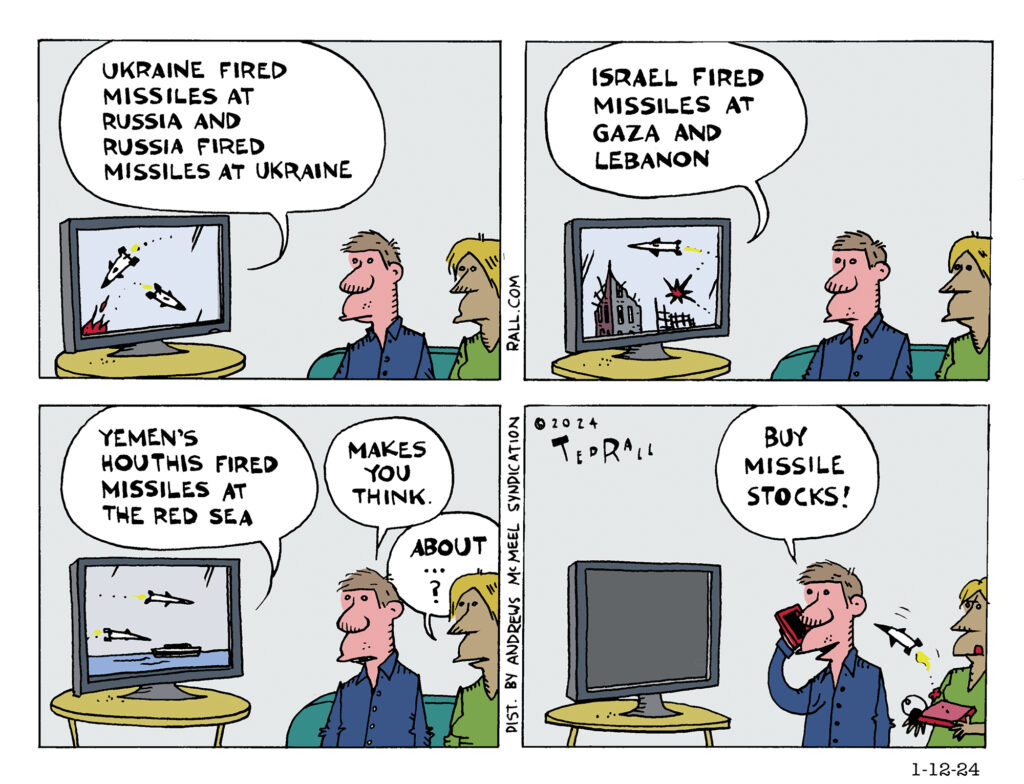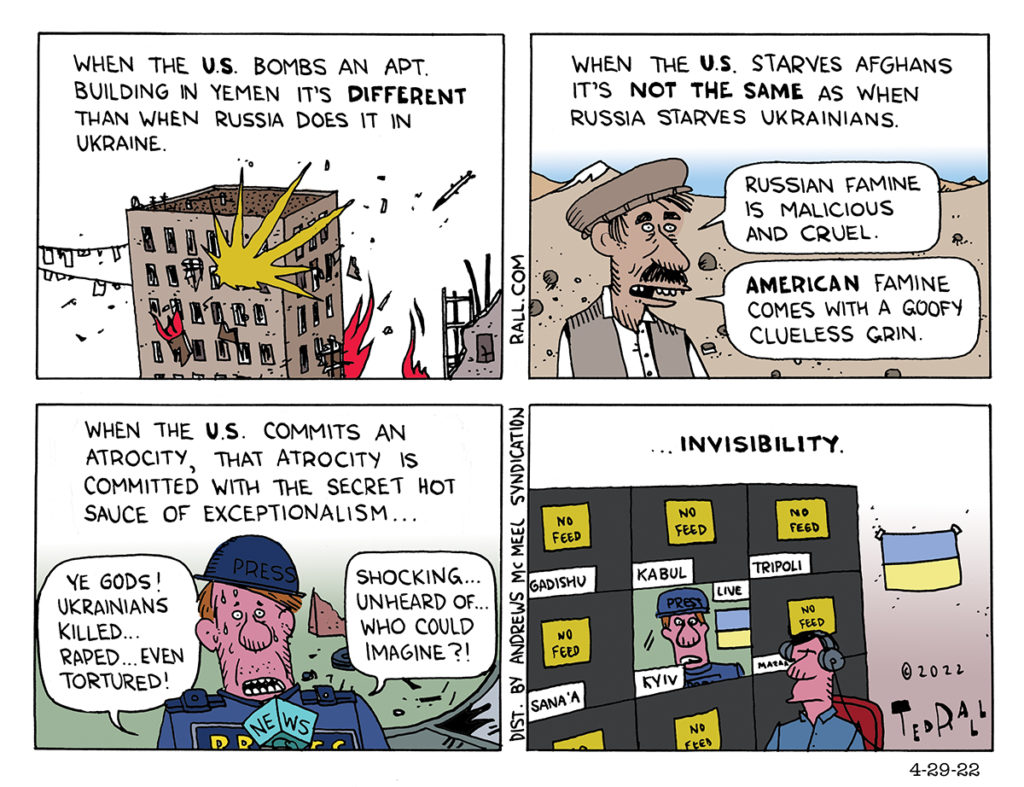Surprisingly, it might not cause Israel much trouble.
The Final Countdown – 2/26/24 – Haley Suffers Embarrassing Defeat in Home State; Vows to Stay in Race
The Final Countdown – 2/5/24 – Migrant Deal and Budget in Limbo as Congress Remains Deadlocked
On this episode of The Final Countdown, hosts Angie Wong and Ted Rall discuss breaking news domestically and abroad, including the Congressional Budget and the U.S. migrant deal.
The Final Countdown – 1/30/24 – United Airlines Navigates Boeing Woes: Explores Possible Airbus Deal
The Final Countdown – 1/16/24 – Trump Triumphs: A Landslide Victory in the Iowa Caucus
On this episode of The Final Countdown, hosts Angie Wong and Ted Rall discuss news from around the world and domestically, including Trump’s victory at the Iowa Caucuses.
The Final Countdown – 1/12/24 – Trump Lashes Out at Opposing Counsel in Defiant Speech at Civil Fraud Trial
On this episode of The Final Countdown, hosts Angie Wong and Ted Rall discuss current events from around the globe, including Trump’s civil fraud trial.
How the U.S. Lost the Ukraine War

The effect of Western sanctions may cause historians of the future to look upon the conflict in Ukraine as a net defeat for Russia. In terms of the military struggle itself, however, Russia is winning.
Watching American and European news coverage, you might ask yourself how can that be? It comes down to war aims. Russia has them. They are achievable.
The United States doesn’t have any.
“As the war in Ukraine grinds through its third month,” the Washington Post reports, “the Biden administration has tried to maintain a set of public objectives that adapt to changes on the battlefield and stress NATO unity, while making it clear that Russia will lose, even as Ukraine decides what constitutes winning. But the contours of a Russian loss remain as murky as a Ukrainian victory.”
War aims are a list of what one side in a military conflict hopes to achieve at its conclusion.
There are two kinds.
The first type of war aim is propaganda for public consumption. An overt war aim can be vague, as when President Woodrow Wilson urged Americans to enter World War I in order to “make the world safe for democracy” (whatever that meant) or specific, like FDR’s demand for the “unconditional surrender” of the Axis powers. A specific, easily measured, metric is better.
Covert war aims are goals that political and military leaders are really after. A covert war aim must be realistic. For example, contrary to the long-standing belief that he viewed the outbreak of the Korean war as an irritating distraction, Stalin approved of and supported North Korea’s invasion of the South in 1950. He didn’t care if North Korea captured territory. He wanted to drag the United States into a conflict that would diminish its standing in Asia and distract it from the Cold War in Europe. The Soviet ruler died knowing that, whatever the final outcome, he had won.
A publicly-stated war aim tries to galvanize domestic support, which is especially necessary when fighting a proxy war (Ukraine) or war of choice (Iraq). But you can’t win a war when your military and political leaders are unable to define, even to themselves behind closed doors, what winning looks like.
America’s biggest military debacles occurred after primary objectives metastasized. In Vietnam both the publicly-stated and actual primary war aim was initially to prevent the attempted overthrow of the government of South Vietnam and to prevent the spread of socialism, the so-called Domino Theory. Then the U.S. wanted to make sure that soldiers who had died at the beginning of the war hadn’t died in vain. By the end, the war was about leveraging the safe return of POWs. A recurring theme of accounts by soldiers in the jungle as well as top strategists at the Pentagon is that, before long, no one knew why we were over there.
Again, in Afghanistan after 2002, war aims kept changing. Mission creep expanded from the goal of defeating Al Qaeda to apprehending Osama bin Laden to building infrastructure to establishing democracy to improving security to using the country as a base for airstrikes against neighboring Pakistan. By 2009 the Pentagon couldn’t articulate what it was trying to accomplish. In the end, the U.S. did nothing but stave off the inevitable defeat and collapse of its unpopular Afghan puppet regime.
Clear war aims are essential to winning. Reacting to his experience in Vietnam, the late General Colin Powell led U.S. forces to victory in the first Gulf War with his doctrine that a successful military action enjoys strong domestic political support, is fought by a sufficient number of troops and begins with a clear military and political objective that leads to a quick exit. After Saddam Hussein’s forces were routed from Kuwait, George H.W. Bush ignored advisers who wanted to expand the conflict into Iraq. America’s mission accomplished, there was a tickertape parade down Broadway, the end.
The U.S. too often involves itself in foreign conflicts without declaring clear war aims—or even knowing themselves what they are. In Korea, Vietnam, Afghanistan and Iraq, unclear or shifting war aims led to endless escalation followed by fatigue on the home front, declining popular will and defeat. Our involvement in the proxy conflicts in Yemen and Syria also have the character of forever wars, though American voters won’t pay much attention as long as the cost is limited to taxpayer dollars rather than their sons and daughters.
I wrote a piece in 2001 titled “How We Lost Afghanistan.” Given that the U.S. had just overthrown the Taliban, it was cheekily counterintuitive. But I was looking at the Afghan war from the Afghan perspective, which is why I was right and the mainstream media was wrong. I see a similar situation unfolding in Ukraine. We are so misled by our cultural biases that we fail to understand the Russian point of view. The U.S. failure to articulate war aims stems from arrogance. We think we’re so rich and powerful that we can beat anyone, even if our strategy is half-assed and we don’t understand politics on the other side of the planet, where the war is.
President Joe Biden’s approach to Ukraine appears to boil down to: let’s throw more money and weapons into this conflict and hope it helps.
That’s not a strategy. It’s a prayer.
Biden says he wants to preserve Ukraine as a sovereign state and defend its territory. But how much territory? How much sovereignty? Would Biden accept continued autonomy for the breakaway republics in the Dombas? The White House appears unwilling to escalate by supporting an attempt to expel Russian forces from eastern Ukraine, much less Crimea—where they are welcomed by a population dominated by ethnic Russians. Short of a willingness to risk nuclear war, the likely ultimate outcome of the U.S. position will be a Korea-like partition into western and eastern zones. A divided Ukraine would create a disputed border—which would disqualify a rump Ukrainian application to join NATO.
Russia’s primary demand is that Ukraine not join NATO. If America’s goal winds up resolving the main reason President Vladimir Putin invaded Ukraine, why is the U.S. involved? A war aim that neatly aligns with one’s adversary’s is grounds for peace talks, not fighting.
Defense Secretary Lloyd Austin recently added a second Ukraine war aim: “We want to see Russia weakened to the degree that it can’t do the kinds of things that it has done in invading Ukraine.” Weakened to what extent? Reduced to a failed state? Mildly inconvenienced? Not only is the policy dangerous, it fails to define a clear objective.
Russia, on the other hand, has secured its allies in the autonomous republics and created a buffer zone to protect them. Crimea will remain annexed to Russia. NATO membership for Ukraine, a chimera to begin with, is now a mere fever dream. Unlike the U.S., the Russians declared their objectives and achieved the important ones.
(Ted Rall (Twitter: @tedrall), the political cartoonist, columnist and graphic novelist, is the author of a new graphic novel about a journalist gone bad, “The Stringer.” Order one today. You can support Ted’s hard-hitting political cartoons and columns and see his work first by sponsoring his work on Patreon.)
The Only Thing Necessary for Evil to Triumph
“The only thing necessary for the triumph of evil is for good men to do nothing.” That statement is often misattributed to Edmund Burke. After Russia invaded Ukraine, many Americans who didn’t have anything to say about the invasion of Afghanistan or Iraq, much less torture at Guantánamo and elsewhere, or Yemen, or Palestine, suddenly started wearing blue and yellow flags. They weren’t good before, so how can these self-serving souls think they are suddenly being good now?
The Secret Sauce of American Exceptionalism
Nothing that Russia is doing in Ukraine is something that the United States has done many times elsewhere over the years. But there’s a big difference in the way that these events get covered. When the US does something horrible, it is dismissed as an incongruous departure from standard American values or simply not covered at all.




